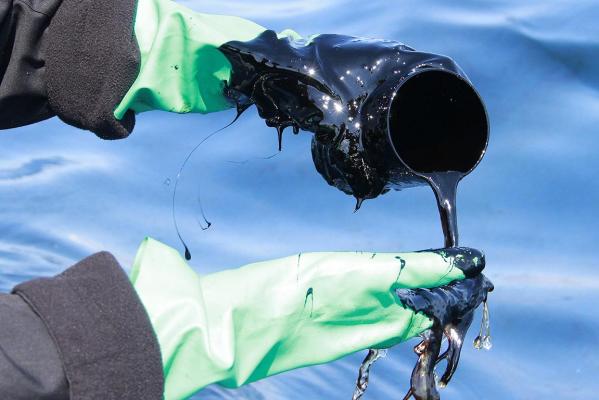Grounded ship threatens environmental disaster for New Zealand
 0 Comment(s)
0 Comment(s) Print
Print E-mail
Xinhua, October 7, 2011
E-mail
Xinhua, October 7, 2011
|
|
|
Oil collected from the water near the stricken cargo ship Rena. |
New Zealand's government warned Friday that an oil tank on a grounded Liberian-flagged container ship has ruptured and oil would soon begin washing ashore on nearby coasts.
The news came as shipping and wildlife agencies said confirmed that oiled birds had been found dead in the water near where the 47,000-tonne Rena had run aground on the Astrolabe reef, about 12 nautical miles offshore, near Tauranga on the east of the North Island.
Maritime New Zealand (MNZ) said Friday it had mobilized more than 100 people in its response to the grounding and the team was planning for all contingencies, including a large-scale oil leak.
MNZ national on-scene commander Rob Service said almost all the 1,700 cubic meters of heavy fuel oil was still contained in the vessel's hull.
MNZ continued testing dispersants Friday after inconclusive results yesterday and expert advice was that dispersants were the best option for dealing with any spilled oil, said Service.
Responding to criticisms from environmental groups that the response to the spill has been slow and ineffectual, Service said it was not practical to put booms around the vessel because they were designed for in-shore use and could not be used in deep water or on a reef far from shore.
MNZ was working closely with Svitzer Salvage, the company appointed as salvors for the Rena, which had representatives on the vessel and was assembling equipment for the salvage operation from around New Zealand, Australia and further afield.
In the meantime, the company was focusing on removing the oil on the ship.
Specialist oiled wildlife teams were patrolling beaches on Motiti Island and the mainland and conducting shoreline assessments of vulnerable areas.
As of Friday afternoon, a little blue penguin had been brought into an oiled wildlife center set up in Tauranga for treatment and there had been reports of more oiled seabirds in the water. The penguin was reported to be in good health, despite being oiled..
SITUATION DETERIORATING
Minister of Transport Steven Joyce, who was expected to arrive at the area Friday, said the priority was to remove the oil from the ship as quickly as possible.
"The difficulty is that the situation is deteriorating and according to the advice I've received, there's the possibility it could break up and sink - it's certainly serious what's going on there," he told the New Zealand Herald newspaper.
He said emergency response teams were moving as fast as they could, but "it's been a bit frustrating for everybody in terms of getting the right equipment to achieve the removal of the oil and containers."
Svitzer Salvage spokesperson Matthew Watson told Radio New Zealand the work could not be rushed, and getting the oil off the vessel would be a very delicate operation.
A naval architect was due to arrive in New Zealand from Holland on Friday and would calculate such things as whether the load on the ship needed to be lightened. The 236-meter Rena was heading to Tauranga from Napier carrying about 1,700 tonnes of fuel, when it grounded on the reef at about 2.20 a.m. Wednesday.
Its cargo included four containers of the hazardous substance ferro-silicon, Radio New Zealand reported Friday.
AWFUL INEVITABILITY
Environmental campaign group Greenpeace Friday expressed " extreme concern" about the oil spill.
Steve Abel, of Greenpeace, said it was an unfortunate illustration of how a slow, and relatively accessible oil spill had clearly stretched New Zealand's response capability to its limits.
"It is also a potential disaster for the blue whales and dolphins presently calving in the area, as well as numerous other marine species," said Abel.
Greenpeace cautioned against any further use of toxic chemicals to disperse the spill.
"The fact is dispersants don't clean up a spill. They only put it out of sight and often add to the harm by increasing the toxic load that wildlife are exposed to," said Abel.
"Once we are through this crisis period, serious questions need to be asked about the government's preparedness and ability to handle oil spills, even of this relatively small scale."
The Environmental Defence Society (EDS) called on Maritime New Zealand to act faster to prevent a "full-scale environmental disaster."
"The area is one that has high natural values with many seabirds, marine mammals and fish at risk from contamination. Nearby beaches and communities are at risk," said EDS chairman Gary Taylor.
"It is now three days since the container ship became stranded on the Astrolabe Reef and there is still no containment boom around the ship to prevent oil dispersing into the wider marine environment. The sea is calm at present and we see no reason why containment should not already be in place," said Taylor.
"We would have thought that there would be a rapid, effective and proven response to this kind of incident and instead are seeing unexplained delays and trialing of different methods of control."
Conservation spokesperson for the main opposition Labour Party Ruth Dyson said the Gulf of Mexico disaster should have prompted the government to have contingency plans ready for such an event.
"The area is teeming with marine life - fur seals, dolphins, orca, whales, snapper, trevally and seabirds, including gannets, petrels and shearwaters," said Dyson.
"There is an awful sense of inevitability about the consequences of this, and not just to wildlife but to the shoreline as well.
"We have known that oil is hugely difficult to remove from the ecosystem for a long, long time."
The 21-year-old vessel was reportedly carrying a cargo of timber, milk powder, meat and fish on a route between Singapore, Australia and New Zealand.







Go to Forum >>0 Comment(s)